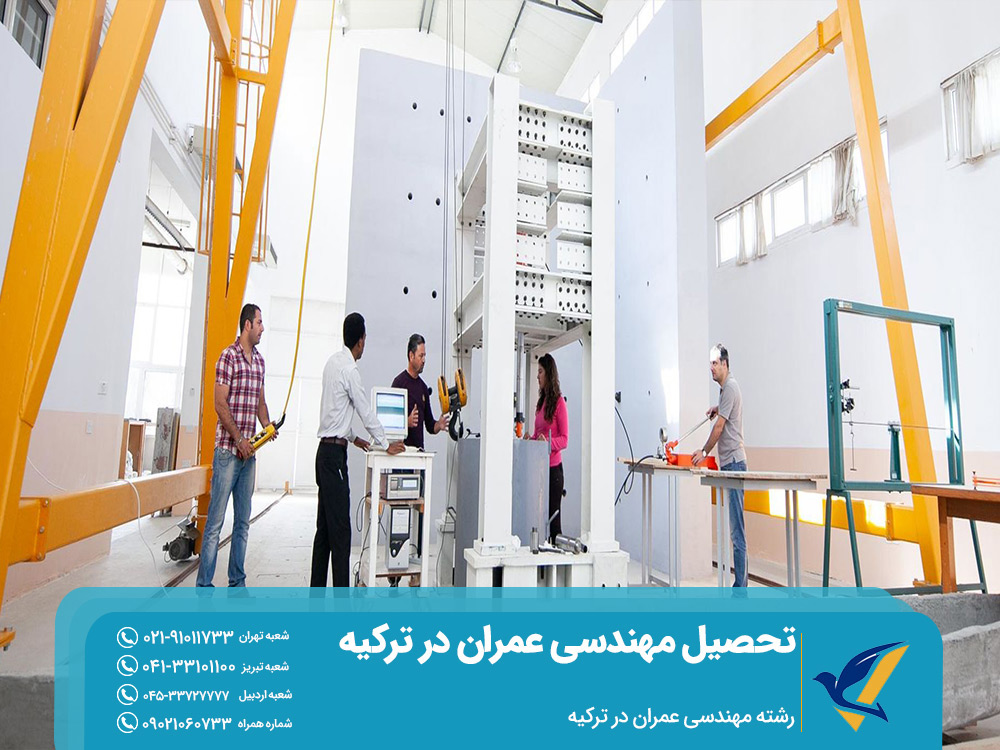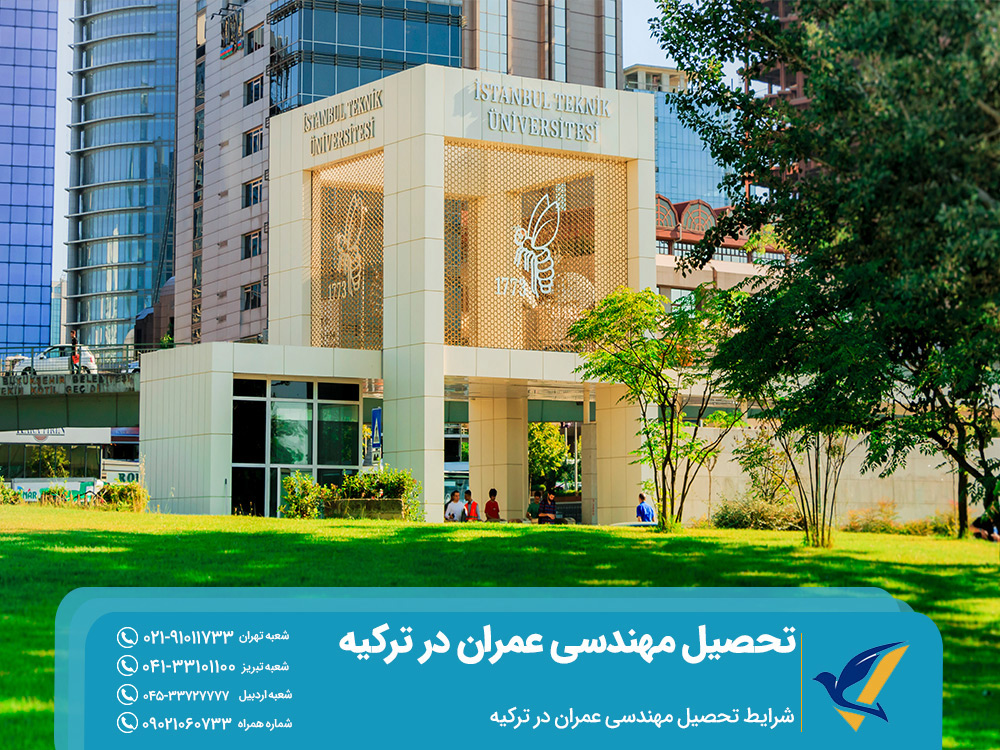Studying Civil Engineering in Turkey in 2025
Pursuing a degree in Civil Engineering in Turkey is a ticket to success and one of the best academic choices for international students. Studying in Turkey can bring about a major transformation in students’ lives and pave the way for a bright future. Civil Engineering programs in Turkey are designed to equip students with all the essential skills and knowledge required to become experienced and successful civil engineers.
Engineering—especially Civil Engineering—is one of the most promising study opportunities for Iranian students in Turkey. Students can study their desired field without facing expensive tuition fees or highly competitive entrance exams. Turkey’s higher education system is of global quality, and its university degrees are widely recognized around the world.
Compared to many European countries, the cost of studying Civil Engineering in Turkey is significantly lower, making it an attractive option for international students. If you are considering studying abroad, this article from Elm Vira explores the opportunities and advantages of studying Civil Engineering in Turkey.
Advantages of Studying Civil Engineering in Turkey
Turkey is one of the leading destinations for international students, known for the high quality of its educational system. Studying Civil Engineering in Turkey comes with several unique benefits. One of the main advantages is the affordable cost of both education and living. Students in Turkish universities can enjoy university housing, transportation, meal plans, and more at a reasonable cost.
Most universities in Turkey have a simple and accessible admission process for international students. By communicating directly with the university, students can easily go through the application and enrollment steps. Turkey’s continuous investment in upgrading research labs, academic exchange programs, and international collaboration has helped elevate the global reputation of its higher education institutions.
Other notable benefits of studying Civil Engineering in Turkey include:
- Affordable tuition and living expenses
- Access to scholarships and financial aid
- Opportunity to apply for residency after graduation
- Internationally recognized degrees
- Possibility of studying in English
Turkey offers a highly attractive environment for students looking to build a successful future in the field of Civil Engineering.
 Civil Engineering in Turkey
Civil Engineering is one of the most popular branches among engineering disciplines. Studying Civil Engineering in Turkey takes 4 years for a bachelor’s degree, 2 years for a master’s degree, and 4 to 5 years for a doctoral degree. The history of Civil Engineering in Turkey dates back to when humans first began using natural resources to create tools, machines, and other devices that made life easier. Early human settlements, initially designed to provide safe shelter for families, gradually evolved into the complex societies we see today.
Civil Engineering in Turkey is a branch of engineering focused on the planning, design, and supervision of infrastructure projects such as residential and public buildings, highways, tunnels, airports, seaports, water treatment plants, dams, and more. This field includes various specialties like construction engineering, transportation engineering, geodesy engineering, fluid mechanics, public health engineering, irrigation engineering, geotechnical engineering, construction management, and others. Some key subjects in the Civil Engineering curriculum in Turkey include:
Civil Engineering in Turkey
Civil Engineering is one of the most popular branches among engineering disciplines. Studying Civil Engineering in Turkey takes 4 years for a bachelor’s degree, 2 years for a master’s degree, and 4 to 5 years for a doctoral degree. The history of Civil Engineering in Turkey dates back to when humans first began using natural resources to create tools, machines, and other devices that made life easier. Early human settlements, initially designed to provide safe shelter for families, gradually evolved into the complex societies we see today.
Civil Engineering in Turkey is a branch of engineering focused on the planning, design, and supervision of infrastructure projects such as residential and public buildings, highways, tunnels, airports, seaports, water treatment plants, dams, and more. This field includes various specialties like construction engineering, transportation engineering, geodesy engineering, fluid mechanics, public health engineering, irrigation engineering, geotechnical engineering, construction management, and others. Some key subjects in the Civil Engineering curriculum in Turkey include:
- Geology
- Electromagnetism and Modern Physics
- Chemistry
- Properties of Building Materials
- Fluid Mechanics
- Wastewater Engineering
- Steel Structure Engineering
- Calculus
- Engineering Mathematics
- Numerical Methods in Engineering
- Structural Analysis
- Construction Management
- Foundation Engineering
- Remote Sensing
Best Universities to Study Civil Engineering in Turkey
Turkey hosts thousands of international students every year from a wide range of countries. There are over 200 universities in Turkey, including 138 public and 62 private institutions. These universities strive to provide the highest quality educational facilities, research, and student services to ensure the best conditions for studying. Some of the top universities for studying Civil Engineering in Turkey are:
- Bahçeşehir University
- Altınbaş University
- Aydın Istanbul University
- Gelişim University
- Okan University Istanbul
- İstinye University Istanbul
- Maltepe University
- Nişantaşı University
- Istanbul Technical University
- Middle East Technical University
- Boğaziçi University
These universities are well-regarded for their academic standards, faculty expertise, and international collaborations, making them excellent choices for pursuing a Civil Engineering degree in Turkey.
 Admission Requirements for Studying Civil Engineering in Turkey
The conditions for studying Civil Engineering in Turkey vary depending on the type of university, language of instruction, and academic level. Generally, the admission process to Turkish universities is quite straightforward and does not require difficult nationwide exams like the Iranian “Konkur.”
For public universities, one of the main requirements to get accepted into Civil Engineering is passing entrance exams such as the SAT or YOS (Yükseköğretim Kurumları Sınavı – Higher Education Institutions Exam). Students must take the exam corresponding to their language of instruction and achieve the required score. Civil Engineering programs in Turkey are offered both in Turkish and English, so applicants need to provide valid language proficiency certificates like TOMER (for Turkish) or TOEFL/IELTS (for English).
In contrast, private universities in Turkey do not require entrance exams. Instead, admissions are based on academic records and language proficiency certificates. A high GPA, a strong academic background, and a well-written motivation letter can significantly improve the chances of acceptance.
Admission Requirements for Studying Civil Engineering in Turkey
The conditions for studying Civil Engineering in Turkey vary depending on the type of university, language of instruction, and academic level. Generally, the admission process to Turkish universities is quite straightforward and does not require difficult nationwide exams like the Iranian “Konkur.”
For public universities, one of the main requirements to get accepted into Civil Engineering is passing entrance exams such as the SAT or YOS (Yükseköğretim Kurumları Sınavı – Higher Education Institutions Exam). Students must take the exam corresponding to their language of instruction and achieve the required score. Civil Engineering programs in Turkey are offered both in Turkish and English, so applicants need to provide valid language proficiency certificates like TOMER (for Turkish) or TOEFL/IELTS (for English).
In contrast, private universities in Turkey do not require entrance exams. Instead, admissions are based on academic records and language proficiency certificates. A high GPA, a strong academic background, and a well-written motivation letter can significantly improve the chances of acceptance.
Required Documents for Studying Civil Engineering in Turkey
The exact documents required for admission and enrollment may vary by university and academic level, but generally, applicants need to prepare the following:
- Copy of passport
- Several passport-size photos
- High school diploma (for undergraduate) or previous degree certificates (for graduate studies)
- Language proficiency certificate (Turkish or English)
- Application form
- Curriculum Vitae (CV)
- Motivation letter
- Letters of recommendation
- Academic transcripts
Having all these documents prepared and meeting the university’s criteria helps smooth the admission process for studying Civil Engineering in Turkey.
 Tuition Fees for Studying Civil Engineering in Turkey
Tuition Fees for Studying Civil Engineering in Turkey
Tuition fees for Civil Engineering in Turkey vary between public and private universities. Generally, private universities charge significantly higher fees compared to public universities. Additionally, postgraduate programs usually have higher tuition fees than undergraduate programs. Another important factor affecting the cost is the language of instruction.
Most Turkish universities offer English-taught programs at higher fees than those taught in Turkish. Below is an estimate of the annual tuition fees for Civil Engineering in some Turkish universities:
- Private universities: approximately $3,000 to $15,000 per year
- Public universities: approximately $500 to $1,500 per year
Career Prospects for Civil Engineering Graduates in Turkey
Civil Engineering is recognized worldwide as a highly in-demand profession. Rapid changes in various aspects of life have increased the need for engineers who can provide essential solutions and complete infrastructure projects to improve human living standards. Therefore, graduates in Civil Engineering have wide job opportunities globally.
Some of the in-demand careers in Civil Engineering in Turkey include:
- Environmental Consultant
- Water Engineer
- Geological Engineer
- Building Services Engineer
- Civil Engineering Contractor
- Site Engineer
- Structural Engineer
- Civil Engineering Consultant
- Construction Supervisor
Summary
Turkey attracts many international students due to its high-quality education and supportive learning environment. The Turkish higher education system emphasizes practical learning and research opportunities, gaining international recognition.
Studying Civil Engineering in Turkey is an excellent choice for Iranian students because of its affordable tuition fees, easy admission process, and the strong international reputation of its degrees. Civil Engineering is a high-demand field with good income potential, ensuring a promising career for graduates.
Compared to many European countries, tuition and living costs in Turkey are much more affordable, allowing students to enjoy a quality student life. Educational migration to Turkey offers a comprehensive experience including a pleasant Mediterranean climate, high-quality education, reasonable tuition fees, and diverse opportunities.
If you are interested in studying Civil Engineering in Turkey, be sure to visit the free consultation section to learn more about admission requirements and available support.
میانگین امتیازات 5 از 5
Vote count: 1 Vote